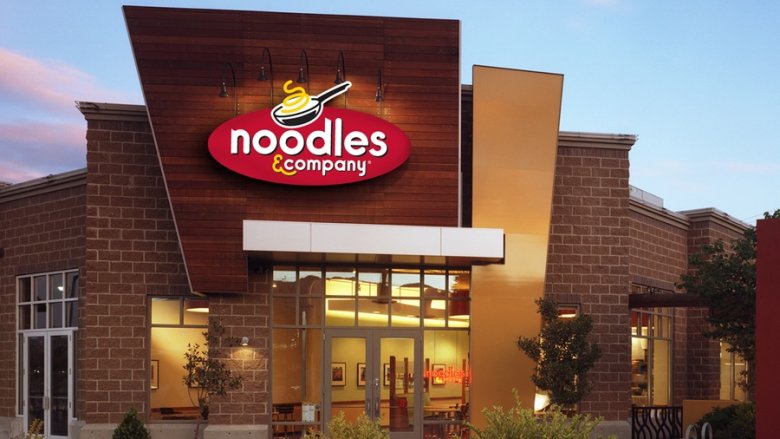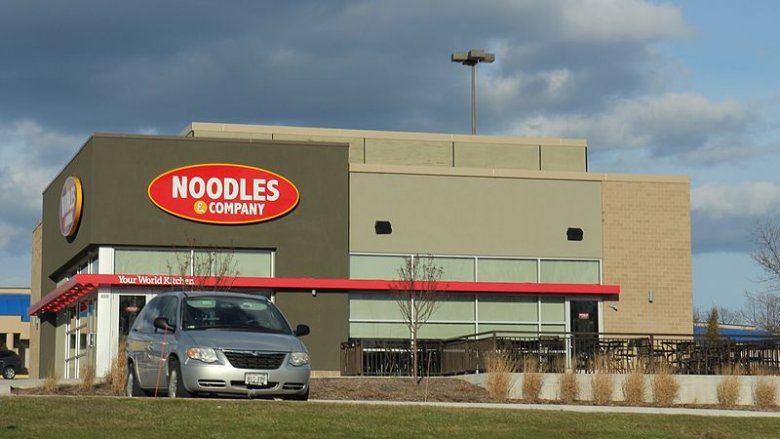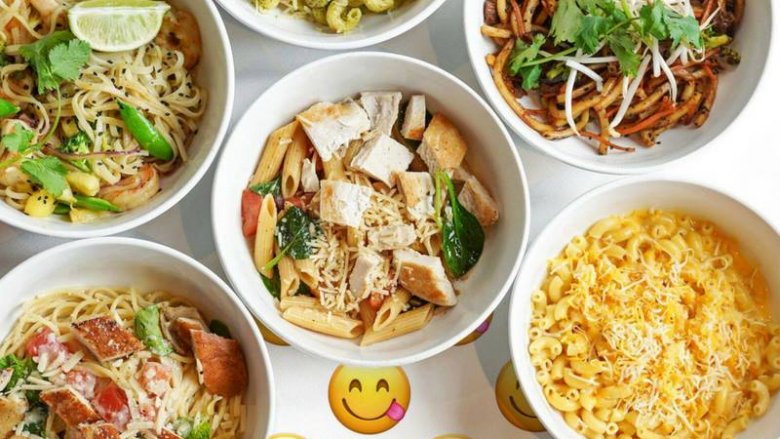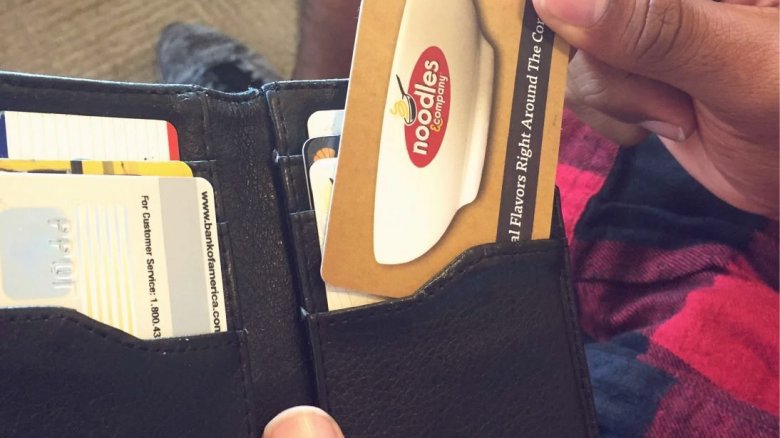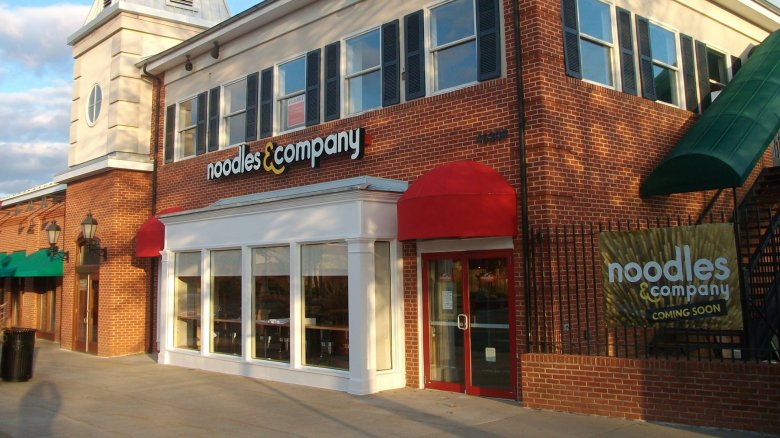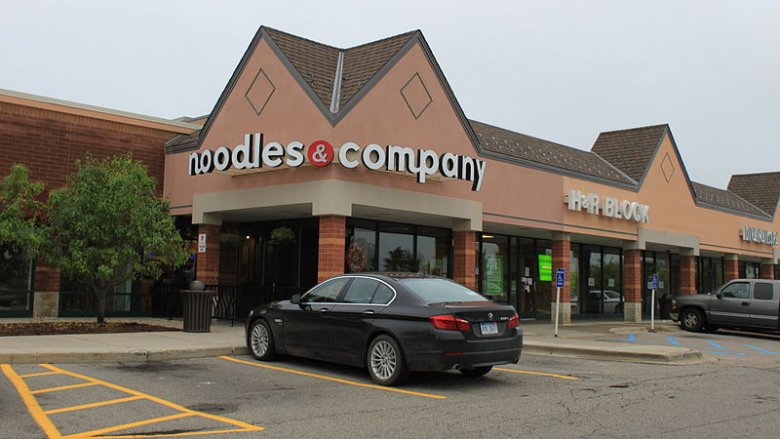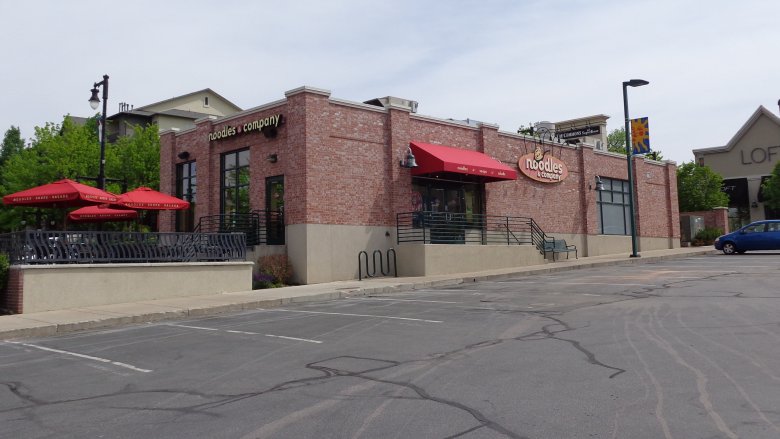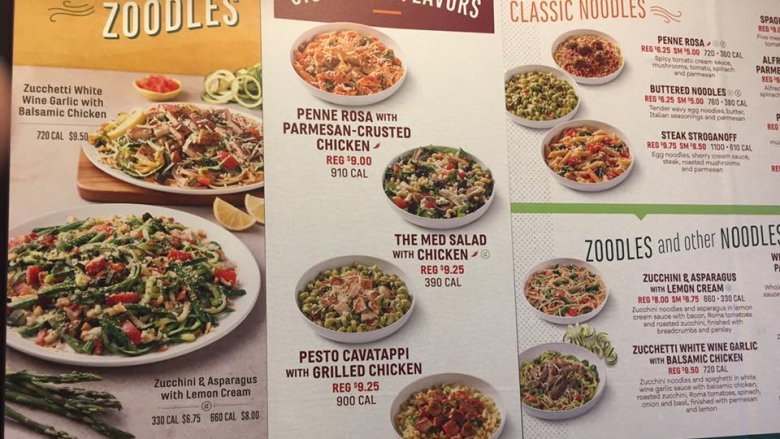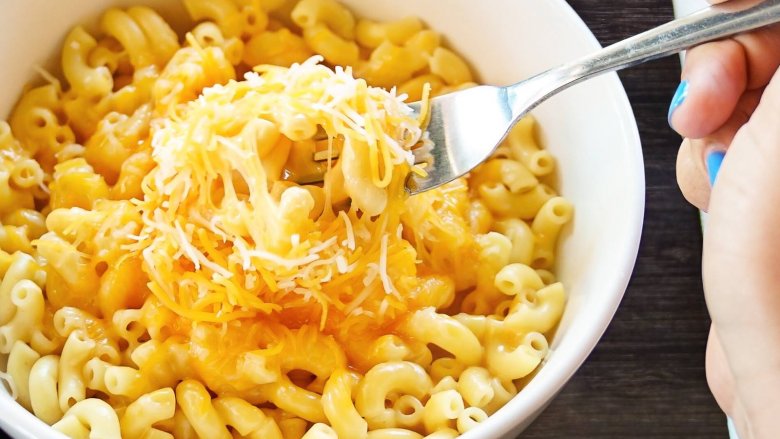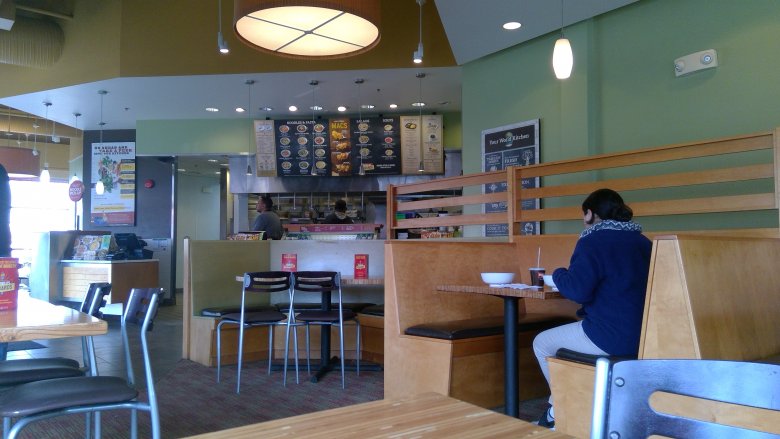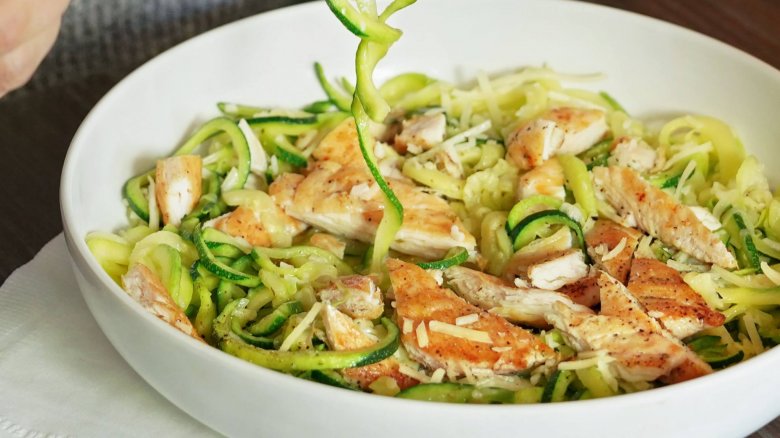The Real Reason Why Noodles And Company Is Struggling
Now headquartered in Broomfield, Colorado, Noodles and Company started in 1995 in Denver's posh Cherry Creek neighborhood. Former Pepsi exec Aaron Kennedy conceived of the idea for a noodle-centric eatery after eating at an Asian noodle shop in New York and realizing a need for restaurants offering that kind of cuisine. After some early setbacks (including harsh reviews by some prominent newspapers in 1996), Kennedy really focused on revamping the entire operation, and it gradually worked. The company went from earning $300,000 in 1995, to raking in over $300 million in 2013.
But the past few years have been a bit of an uphill battle for the pasta palace, and a lot of people are wondering how much longer it will survive. At the end of 2018, MoneyWise placed it sixth in a list of 17 chain restaurants that are disappearing the fastest. Despite recent closures, Noodles and Company still plans to expand in the markets where the restaurants do thrive — but it might have some considerable work to do if it wants to maintain its position as the go-to location for an international assortment of carb bowls. Here are some legitimate reasons why Noodles and Company is struggling.
Its stocks collapsed
In 2013, Noodles and Company launched a successful IPO. Shares in the company "more than doubled on the first day of trading." But by July of 2014, the stocks had plummeted 33 percent in value. Investors definitely lost that loving feeling for the noodle chain. At two years post-IPO, the value declined by 73.15 percent. The sting of that kind of downward turn is one that not even the gooiest bowl of mac and cheese can soothe.
Things started to look up for the company in 2018 due to a stock surge in April. The 22 percent gain, according to The Motley Fool, had investors in a good mood despite the fact that "the stock remained down sharply from its initial public offering price back in 2013." Unfortunately, it took another nosedive in October 2018 with a 20 percent drop. Apparently, the addition of delivery and zucchini noodles helped boost earnings in early 2018 — which led to that spring surge — but it doesn't appear that the company will return to being a stock market darling any time soon.
Its business model is inherently risky
Noodles and Company prides itself on offering "craveable flavors from around the world." Its noodle dishes (and salads and soups) range from Japanese and Thai, to American and Italian. While some might deem more variety to be a positive asset, it's not necessarily smart when you're trying to grow a successful chain restaurant biz. In fact, some experts claim this business model is exactly why Noodles and Company has turned out to be a less than stellar investment. According to Forbes contributor Panos Mourdoukoutas, it's problematic because "localizing a global menu may be a great idea, but it requires too many employees, making the product too costly to deliver."
So, there's an issue with the additional labor costs but there's also the simple issue of branding. It's hard to tell exactly what Noodles' speciality really is (besides, well, noodles — but clearly that's not enough). The Motley Fool contributor Timothy Green points out, "Noodles is unique in that other casual dining restaurants don't offer that kind of variety, but I suspect there's a good reason why they don't." In an attempt to appeal to everyone, you can risk appealing to no one. So it appears not sticking to one distinct genre of noodle cuisine is definitely a questionable approach in the competitive world of fast casual dining.
The 2016 data breach
If your identity isn't safe when you're buying a bowl of buttered pasta, is it ever really safe? Many consumers had to ask themselves this question when Noodles and Company announced in the summer of 2016 that the account information of debit and credit cards used at 28 of its restaurant had possibly been compromised. The company Noodles used to process its credit card payments tipped them off to the suspicious activity, which allegedly resulted in the acquirement of card holder names, numbers, expiration dates, and CVV codes.
Diners who had used their cards at a select list of Noodles spots between January 31 and June 2 of 2016 were advised to monitor their accounts closely. The company issued a press release offering a blow-by-blow of the incident, with tips for what those who thought their data might have been compromised needed to do, a help line they could call, and some other 4-1-1 facts about identity theft. The breach was no doubt some bad PR and a hassle for the company. They acknowledged in their second quarter 2018 financial results that they spent $3.4 million investigating the data breach. The ominous phrase "data breach" is sure to scare away even the most devoted of spaghetti lovers.
More fallout from the data breach
As if the bad press from the actual breach wasn't enough, later in 2016, an Oregon credit union sued Noodles and Company for failure to facilitate the necessary security measures to prevent the breach from happening. The credit union sought class action status for the lawsuit, claiming financial institutions had to bear the brunt of the expense of replacing cards, halting transactions and refunding non-customer purchases, among other hassles. The plaintiffs also called out Noodles and Company for not having implemented the chip system for credit cards. (To Noodles' credit though, chip readers are a pain).
A judge ended up dismissing the lawsuit, claiming that ultimately the law protected Noodles in this instance and that the financial institutions needed to take up their issues with Visa and Mastercard. Still, it's never great PR to be entangled in the legal system for any reason, and the dismissal didn't happen overnight. The lawsuit was filed in September 2016 and not dismissed until July 2017. It's not hard to imagine that Noodles and Company's legal troubles could have left a bad taste in the mouth of many hungry, noodle-loving consumers.
The labor law violation lawsuit
Noodles and Company was up against another legal hurdle when former employees filed a lawsuit claiming they were owed some coin for overtime hours. The former assistant managers accused the company of dubbing them exempt from the Fair Labor Standards Act. While Noodles' reps claimed because these workers were on salary, they were part of the law's "white-collar exemption,"' the former managers argued that they were expected to do the same tasks as the hourly workers who did receive overtime, and that they "exercise no little or no managerial discretion."
While Noodles and Company agreed to pay out $3 million (some of which went to the lawyers for the plaintiffs) in a settlement agreement in 2016, it never officially owned up to any labor law violations. It's possible that the accusations and subsequent lawsuit did give the company a reputation for not treating workers well, which could be why a lot of fast casual diners added Noodles and Company to their do-not-support list.
It closed a lot of restaurants in 2017
In February of 2017, Noodles and Company announced it was shutting down 55 of its 528 locations (at the time). The company cited underperformance at the restaurants and claimed its overall earnings would have increased by $7.3 million if not for those 55 dead weights. That's one tough noodle to swallow.
While one of its shareholders stepped in to quasi save the day with an $18.5 million boost in exchange for permission to buy additional shares and preferred stock, Noodles still had a lot of work to do to make up for the lackluster performance of its restaurants that went bust. According to CEO Dave Boennighausen, "These initiatives focus on our strong, go-forward restaurant portfolio; shore up our balance sheet; and give us the financial flexibility to further our in-restaurant operational and culinary initiatives." That might or might not be corporate jargon for "we've got to get our s**t together ASAP," but either way, signs of overall closure might be suspicious for customers who prefer to dine where business is booming.
Quality versus cost
When you're cooking at home, pasta is generally one of the cheapest options around. A bag of noodles at your average grocery store chain barely sets you back $2, which is why if you're a restaurant serving up pasta dishes, they better be so delicious that they justify the higher price tag. According to some, Noodles isn't delivering carb concoctions that are worth the extra dough.
A staff writer for the CU Independent claimed, "I could have gone to Safeway to buy some noodles, some marinara, and a chicken breast, cooked it all myself, added some spices and still spent less than $9. Plus, it would've tasted better." One unsatisfied Noodles and Company customer took to Trip Advisor to air their complaints saying, "This place is too expensive for no more noodles than you get. The beef stroganoff was horrific. The noodles tasted like pure starch." And another unhappy customer wrote on Pissed Consumer, "We have noticed that the quality (and quantity) of the food has been steadily going downhill... the prices sure aren't going down, they've actually gone up. We won't be back to Noodles anymore, we had given it too many chances."
Budget-conscious diners might be tempted to save the money allotted for going out to eat for places that don't make dishes they could easily whip up at home for at least half the cost and possibly better flavor.
The cross-contamination issue
If you are living that #gflife (that's "gluten-free life" for those not in the know on the hashtag we just made up) for serious medical reasons and your body reacts negatively to any trace of the stuff, you know how hard it is to find a restaurant that's truly, for real, 100 percent free of gluten. It's nearly impossible.
So it would make sense that when you do decide to brave it all and go to a restaurant, it might not be wise to choose one whose primary product could also go by Captain Gluten, even if there are gluten-free options on the menu. Even Noodles and Company itself admits that individuals with gluten allergies or intolerance should dine at their own risk. The company states on its website, "Even with a strict adherence toward maintaining spotless restaurants, we simply have too much wheat and gluten present to be able to eliminate the cross contamination on our equipment and food prep areas."
While this might not have been an issue when the restaurant started in the 1990s, it can be a serious deal breaker for the gluten-phobic sector of today's diners. As the anti-gluten lifestyle has become more common, it's possible that a lot of consumers are much more likely to choose a restaurant that doesn't glorify the enemy (gluten).
Chain restaurants are on the decline
Chain restaurants are so not hot right now. With a growing preference for local, sustainable menus, a lot of consumers are shunning former American staples like TGI Friday's, Ruby Tuesday, and IHOP. While it's true that Noodles and Company is more aligned with the fast casual trend also brought to you by places like Panera and Chipotle (the latter of which isn't doing so great either), it's still got the chain factor that people aren't really vibing. While establishments like Red Lobster are still fighting the good fight, a lot of chains like Cheesecake Factory and Outback Steakhouse, are facing a dismal outlook.
Americans' growing preference for delivery and healthier fare could also be to blame for the demise of the dine-in chain. Hopefully the success of Noodles and Company's zoodle-based dishes (more on that in a minute) and its steady efforts at being delivery-friendly will continue to solidify its presence as a chain that's still worth frequenting.
Zoodles might be the key to success
Keto was the most popular diet of 2018, and it isn't exactly noodle friendly. Keto enthusiasts are primarily consuming foods that are high fat and low carb, and flour-based pasta definitely isn't one of them. Of course, it's just one of many low carb diets that have taken hold of Americans over the past few decades. But there is no doubt that carb-conscious diners usually avoid places like Noodles and Company.
Better late than never, Noodles and Company has finally gotten with the times. Its introduction of the zucchini-based noodle (or "zoodle") to menus in May 2018 has turned things around in the major way for the brand. In July 2018, the company reported a 4.1 percent revenue increase, from $112.8 million to $117.4 million. The momentum continued into 2019, when Noodles and Company announced that in the final quarter of 2018 revenue increased another 3.7 percent. CEO Dave Boennighausen happily reported, "For years, the company struggled with the perception that noodles and pasta are unhealthy for you, due to the relatively high amount of carbohydrates in our core dishes. The zucchini noodle has allowed us to address this concern."
Zoodles have definitely been a game changer for the struggling noodle peddler, which is a great sign for its future. It looks like Noodles and Company fanatics can breathe a little easier knowing that their beloved carb heaven might just stick around awhile longer.
